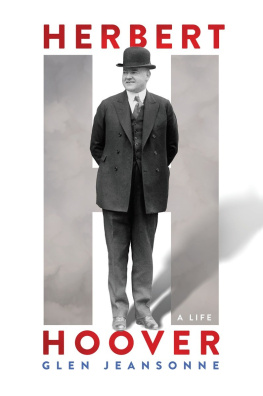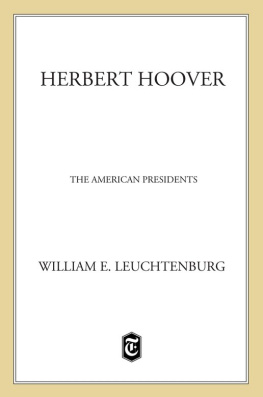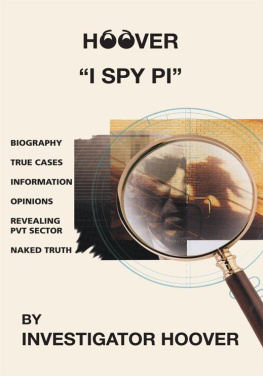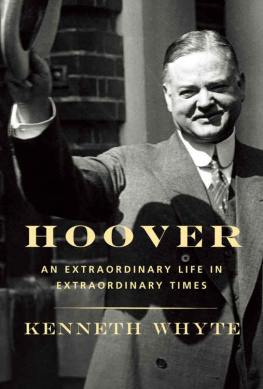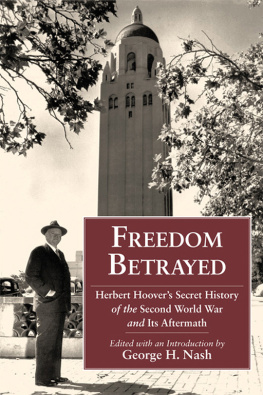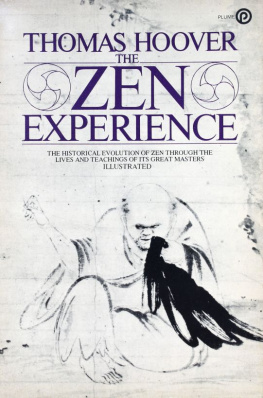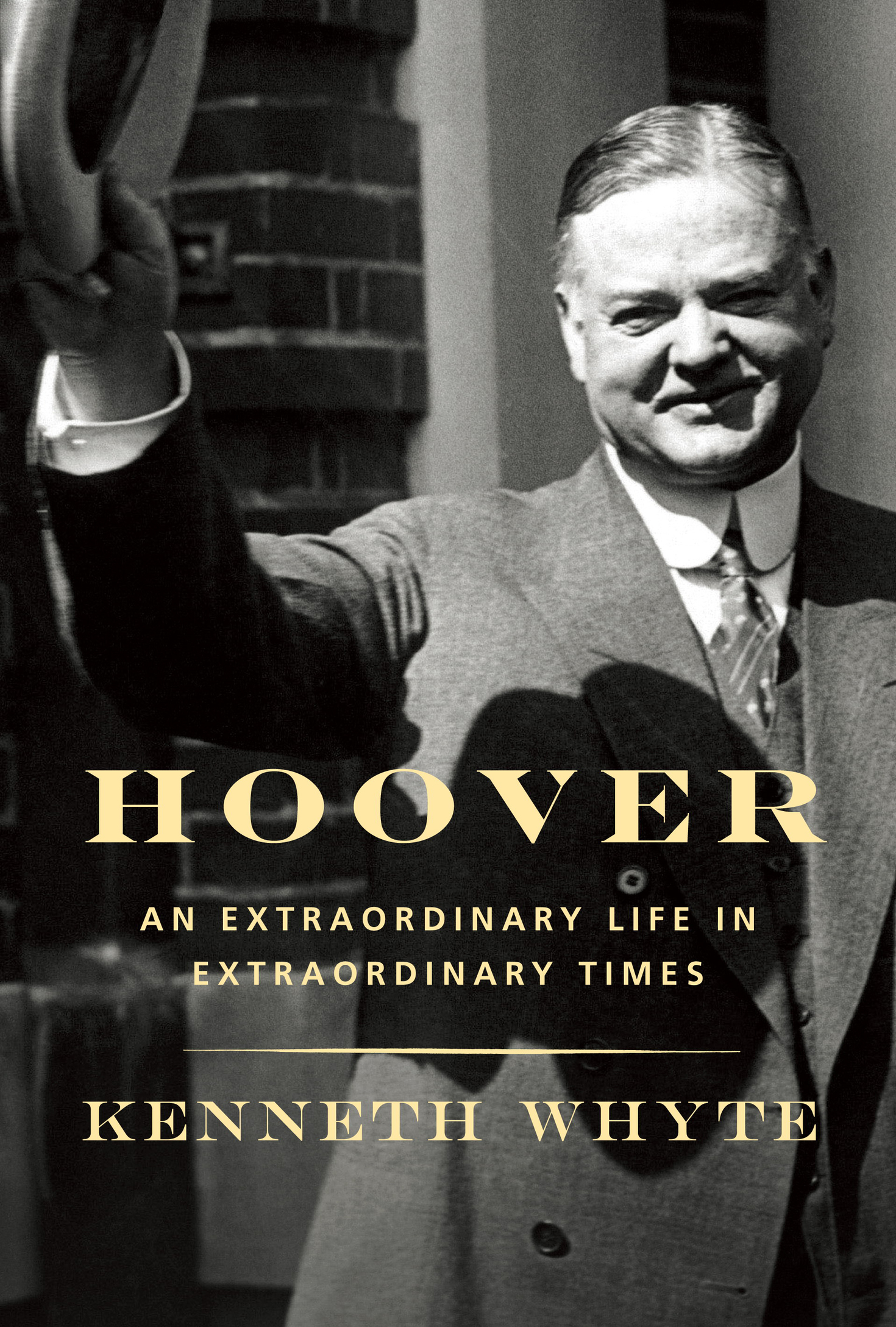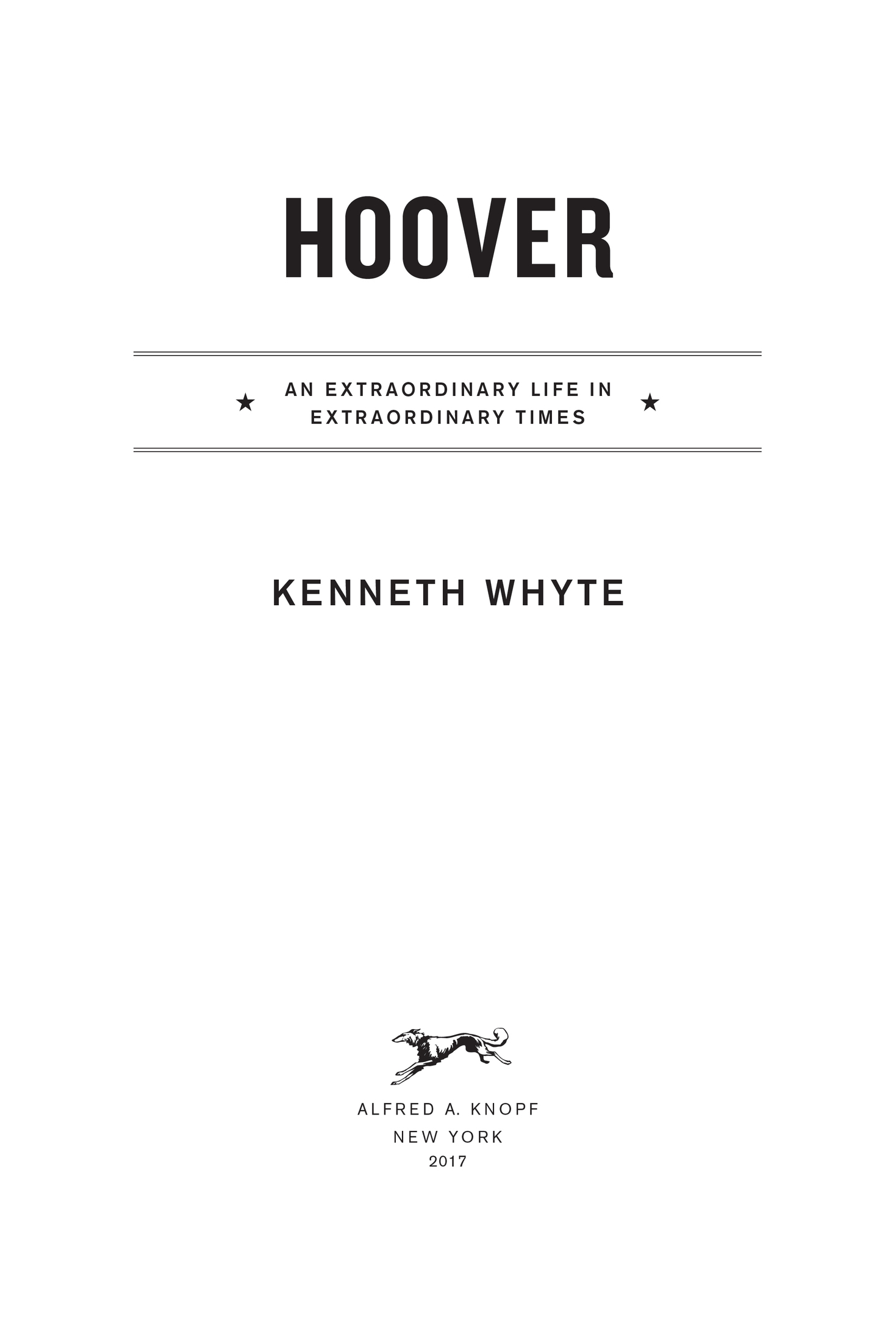Contents
ALSO BY KENNETH WHYTE
The Uncrowned King: The Sensational Rise of William Randolph Hearst
THIS IS A BORZOI BOOK
PUBLISHED BY ALFRED A. KNOPF
Copyright 2017 by Kenneth Whyte
All rights reserved.
Published in the United States by Alfred A. Knopf, a division of Penguin Random House LLC, New York, and distributed in Canada by Random House of Canada, a division of Penguin Random House Canada Limited, Toronto.
www.aaknopf.com
Knopf, Borzoi Books, and the colophon are registered trademarks of Penguin Random House LLC.
constitutes an extension of this copyright page.
Library of Congress Cataloging-in-Publication Data
Names: Whyte, Kenneth, author.
Title: Hoover : an extraordinary life in extraordinary times / by Kenneth Whyte.
Description: First edition. | New York : Alfred A. Knopf, 2017. | A Borzoi Book. | Includes bibliographical references and index.
Identifiers: LCCN 2017015685 | ISBN 9780307597960 (hardcover) | ISBN 9781524732462 (ebook)
Subjects: LCSH : Hoover, Herbert, 18741964. | PresidentsUnited StatesBiography. | United StatesPolitics and government19291933. | United StatesPolitics and government19191933.
Classification: LCC E 802. W 49 2017 | DDC 973.916092 [ B ]dc23
LC record available at https://lccn.loc.gov/2017015685
Ebook ISBN9781524732462
Cover image: Future president Hoover, after his nomination for the presidency, June 1928. Everett Collection, Inc. / Alamy
Cover design by Carol Devine Carson
v4.1
a
For Tina
CONTENTS
CHAPTER 1
A Pretty Stiff Time
CHAPTER 2
A Whole Jug Full of Experience
CHAPTER 3
I Am the Devil
CHAPTER 4
The Adventures of Hu-hua and Hoo Loo
CHAPTER 5
The Late Jar Rather Smashed My Nerves
CHAPTER 6
What Lies Beyond Wealth
CHAPTER 7
Hard to State Without Becoming Hysterical
CHAPTER 8
A Pirate State Organized for Benevolence
CHAPTER 9
Make Way for the Almoner of Starving Belgium
CHAPTER 10
A Hero in the House of Truth
CHAPTER 11
Inconsolable in the Hall of Mirrors
CHAPTER 12
An Engineer at the Opera
CHAPTER 13
Meddling with Gods Economy
CHAPTER 14
Hoover Versus a Botched Civilization
CHAPTER 15
Scandal, Embarrassment, and the Little Feller
CHAPTER 16
Sleepless in Good Times
CHAPTER 17
The Wonder Boy
CHAPTER 18
Giving Genius Its Chance
CHAPTER 19
He Didnt Know Where the Votes Came From
CHAPTER 20
Nothing to Fear but Fear Itself
CHAPTER 21
Just When We Thought It Was Over
CHAPTER 22
It Seemed Like the End of the World
CHAPTER 23
The President in His Fighting Clothes
CHAPTER 24
A Human Creature Desperately Hurt and Pained
CHAPTER 25
Through the Abyss in a Buick
CHAPTER 26
Father of the New Conservatism
CHAPTER 27
Reborn in a Darker World
EPILOGUE
I Admire a Lot in Hoovers Career
PREFACE
A contemporary once described Herbert Hoover as the sort of man to whom the incredible was forever happening. Following a tragic childhood in which he was orphaned at the age of nine, he graduated (barely) with the inaugural class at Stanford University, made a name for himself in the rich goldfields of the Australian outback, and, still in his twenties, pulled off the biggest mining transaction in the history of China. The deal closed months after he had been given up for dead in the Boxer Rebellion. Settling later in London at the height of the Edwardian era, he raised a family, established himself as a global mining tycoon, and gained international acclaim as a humanitarian in the early years of the Great War. After almost single-handedly resurrecting the European economy during the Versailles peace talks, he returned to America, where he knew every president from Theodore Roosevelt to Richard Nixon, serving five of them in important roles in addition to fulfilling his own term in the White House. He remained a momentous and controversial figure through the New Deal, the Second World War, and into the Cold War, ending his days chasing bonefish in the Florida Keys and writing books, several at a time, in a luxurious suite in the Waldorf Towers with Cole Porter and the Duke of Windsor for neighbors.
The challenge for Hoover biographers has never been a lack of exploit. Rather, it has been to find a coherent personality amid the nonstop action. As historical figures go, Hoover is a blur. He shielded himself from the scrutiny of journalists, independent biographers, and other strangers. Allergic to introspection, he rarely registered his thoughts and feelings in private conversation, let alone in diaries or journals. Wanting only to be remembered for his achievements, he destroyed an unknown quantity of his familys correspondence. His three volumes of autobiography reveal little of personal significance and what is divulged is often unreliable.
Fortunately, much of Hoovers life was lived in public, and he was often closely observed despite his reticence. Many of those working with him realized they were in the company of an extraordinary man and recorded honest and intimate impressions of him in their notes, letters, diaries, and memoirs. As well, important family correspondence escaped Hoovers purges. The portrait that emerges here is largely constructed from these sources, many of them not previously utilized.
Helpful as the sources are in locating elements of Hoovers personality, making sense of what is found is another matter. His capacities and achievements are obvious and awe-inspiring. Among the forty-four chief executives, he stands with the most intelligent and erudite, and none worked harder. He was the only president to have enjoyed two brilliant careers before the White House, and next to John Quincy Adams he was its most cosmopolitan inhabitant, having lived two decades abroad and circled the globe five times before the age of aviation. He was also a man of enormous goodwill, supporting with countless acts of charity his needy friends and relatives, not to mention the family of a colleague who was jailed for swindling him out of a large sum of money. The number of lives Hoover saved through his various humanitarian campaigns might exceed 100 million, a record of benevolence unlike anything in human history. Yet at the same time he bristled with more than the usual array of eccentricities, tics, tempers, neuroses, failings, and contradictions. He carried through his days the scars of his miserable boyhood, and he seems to have been determined in certain phases of his existence to prove points and settle scores of interest only to his bruised psyche. A man of force, quick-minded and brusque, he could be dangerous in pursuit of his interests, and he would rightly be concerned during his political years to obscure certain records from his business career. Tormented by guilt and paranoia, he twice broke down when his least honorable deeds came under public scrutiny.
The cracks and tensions in Hoovers personality expressed themselves in curious ways. When frustrated in pursuit of a righteous cause, he could fight with the heart of a saint and the conscience of a robber baron. He had a habit of crushing individuals and organizations who shared his objectives. Disliked, as a rule, by other politicians, including many Republicans, he disapproved of them in turn yet sought to lead them as head of state. Somehow he inspired fierce loyalty in chosen colleagues and employees without going to the trouble of forming normal human relationships with them. He knew thousands of eminent personages around the world yet related better to children. Genuinely modest, he had an almost biological compulsion to see his name in the papers. An introvert, he rarely ate a meal alone. A faithful family man, he was for decades almost a bystander in his familys life.


